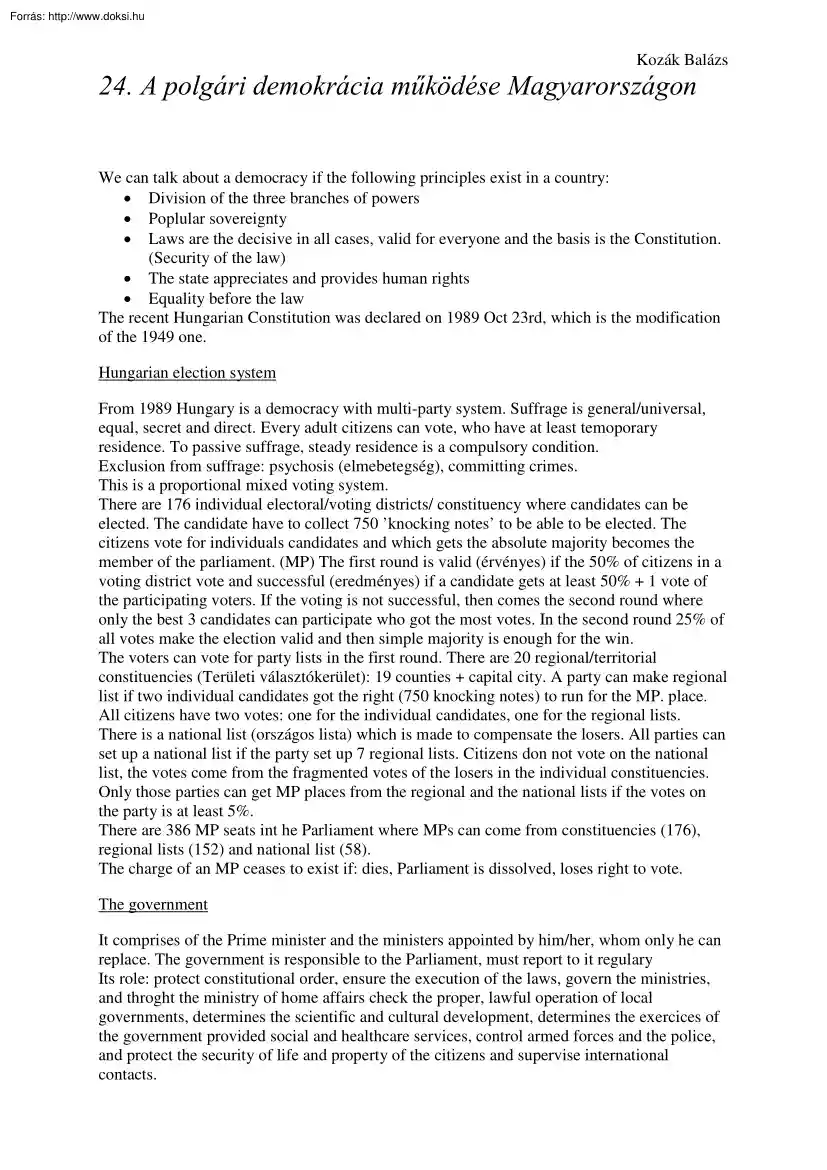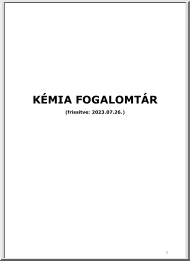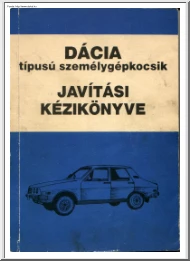A doksi online olvasásához kérlek jelentkezz be!

A doksi online olvasásához kérlek jelentkezz be!
Nincs még értékelés. Legyél Te az első!
Tartalmi kivonat
Kozák Balázs 24. A polgári demokrácia működése Magyarországon We can talk about a democracy if the following principles exist in a country: • Division of the three branches of powers • Poplular sovereignty • Laws are the decisive in all cases, valid for everyone and the basis is the Constitution. (Security of the law) • The state appreciates and provides human rights • Equality before the law The recent Hungarian Constitution was declared on 1989 Oct 23rd, which is the modification of the 1949 one. Hungarian election system From 1989 Hungary is a democracy with multi-party system. Suffrage is general/universal, equal, secret and direct. Every adult citizens can vote, who have at least temoporary residence. To passive suffrage, steady residence is a compulsory condition Exclusion from suffrage: psychosis (elmebetegség), committing crimes. This is a proportional mixed voting system. There are 176 individual electoral/voting districts/ constituency where candidates
can be elected. The candidate have to collect 750 ’knocking notes’ to be able to be elected The citizens vote for individuals candidates and which gets the absolute majority becomes the member of the parliament. (MP) The first round is valid (érvényes) if the 50% of citizens in a voting district vote and successful (eredményes) if a candidate gets at least 50% + 1 vote of the participating voters. If the voting is not successful, then comes the second round where only the best 3 candidates can participate who got the most votes. In the second round 25% of all votes make the election valid and then simple majority is enough for the win. The voters can vote for party lists in the first round. There are 20 regional/territorial constituencies (Területi választókerület): 19 counties + capital city. A party can make regional list if two individual candidates got the right (750 knocking notes) to run for the MP. place All citizens have two votes: one for the individual candidates,
one for the regional lists. There is a national list (országos lista) which is made to compensate the losers. All parties can set up a national list if the party set up 7 regional lists. Citizens don not vote on the national list, the votes come from the fragmented votes of the losers in the individual constituencies. Only those parties can get MP places from the regional and the national lists if the votes on the party is at least 5%. There are 386 MP seats int he Parliament where MPs can come from constituencies (176), regional lists (152) and national list (58). The charge of an MP ceases to exist if: dies, Parliament is dissolved, loses right to vote. The government It comprises of the Prime minister and the ministers appointed by him/her, whom only he can replace. The government is responsible to the Parliament, must report to it regulary Its role: protect constitutional order, ensure the execution of the laws, govern the ministries, and throght the ministry of home affairs check
the proper, lawful operation of local governments, determines the scientific and cultural development, determines the exercices of the government provided social and healthcare services, control armed forces and the police, and protect the security of life and property of the citizens and supervise international contacts. Kozák Balázs The government ceases to exist if: new Parliament is formed, Prime minister dies, prime minister loses its right to vote. Motion of non-confidence Can be initiated by one fifth of the MPs, have to name the new prime minister to provide stability to the government. Simple majority decides Moreover, the majority must agree on the program of the new government. The Parliament Makes laws Creates the constitution Highest state organ of the Republic of Hungary and the means of the popular sovereignty. Prosecutor Office Its role: to protect the rights of all citizens, check investigations The President Head of the state. Role: to check the democratic
functioning of the state Elected with secret poll by the Parliament for 5 years (can be reelected once). Declares the laws made by the Parliament or sends back once to control by the constitutional court. Commander of armed forces, his power increases in case of danger, extraordinary actions. Inviolable! Constitutional Court From 1989, 11 members, elect persident among themselves. Judges elected for 9 years by the Parliament. Role: ensure constitutional rights, laws, supervising new laws Independent from all other institutions of the state. The resolutions of the constitutional court are valid for everyone and unappealable. Local governments/City hall/City council (önkormányzatok) Executive power of a certain settlement. Its role is to provide basic services: education, healthcare, infrastucture, development, handling financial affairs etc. Local governments have the statue-making right. (Rendeletalkotási jog) Parliament commissionares, Ombudsmans Independent commissionar, only
responsible to the Parliament. Investigates breach of the law in case of state organs. Cannot make laws, statues eetc, can only make advice to the Parliament. Commissioner for civil rights (Állampolgári jogok biztosa) Deputy of the commissioner for civil rights Commissioner for data rights (Adatvédelmi biztos) Commissioner for minority rights State Office of auditors/State court of auditors/State organisation of auditors Most important supervising organ of finances. Subordinates to theParliament and the laws Has the right to check everywhere where money coming from the state is used. Its leadership is elected by 2/3 majority of the MPs for 12 years. Kozák Balázs Highest court of justice Highest court to appeal. Role: reconsiders appeal of supervision reconsiders appeals from lower court considers cases in her authority (hatáskör) makes resolutions compulsory to all courts Court of justice • • • • • • Independent branch of power, hierarchical. Role of judges is
the jurisdiction: civil or penalty jurisdiction Courts dealing with labour courts judge labour relation (munkaviszony) cases Basis for jurisdiction is the independence of the judges The President appoints or absolves judges. Judges have right of immunity (mentelmi jog) and wide range incompatibility. Judges are impartial President of the Highest Court of justice is elected by the Parliament for 6 years. His role is to make legal unity and declare precedent cases
can be elected. The candidate have to collect 750 ’knocking notes’ to be able to be elected The citizens vote for individuals candidates and which gets the absolute majority becomes the member of the parliament. (MP) The first round is valid (érvényes) if the 50% of citizens in a voting district vote and successful (eredményes) if a candidate gets at least 50% + 1 vote of the participating voters. If the voting is not successful, then comes the second round where only the best 3 candidates can participate who got the most votes. In the second round 25% of all votes make the election valid and then simple majority is enough for the win. The voters can vote for party lists in the first round. There are 20 regional/territorial constituencies (Területi választókerület): 19 counties + capital city. A party can make regional list if two individual candidates got the right (750 knocking notes) to run for the MP. place All citizens have two votes: one for the individual candidates,
one for the regional lists. There is a national list (országos lista) which is made to compensate the losers. All parties can set up a national list if the party set up 7 regional lists. Citizens don not vote on the national list, the votes come from the fragmented votes of the losers in the individual constituencies. Only those parties can get MP places from the regional and the national lists if the votes on the party is at least 5%. There are 386 MP seats int he Parliament where MPs can come from constituencies (176), regional lists (152) and national list (58). The charge of an MP ceases to exist if: dies, Parliament is dissolved, loses right to vote. The government It comprises of the Prime minister and the ministers appointed by him/her, whom only he can replace. The government is responsible to the Parliament, must report to it regulary Its role: protect constitutional order, ensure the execution of the laws, govern the ministries, and throght the ministry of home affairs check
the proper, lawful operation of local governments, determines the scientific and cultural development, determines the exercices of the government provided social and healthcare services, control armed forces and the police, and protect the security of life and property of the citizens and supervise international contacts. Kozák Balázs The government ceases to exist if: new Parliament is formed, Prime minister dies, prime minister loses its right to vote. Motion of non-confidence Can be initiated by one fifth of the MPs, have to name the new prime minister to provide stability to the government. Simple majority decides Moreover, the majority must agree on the program of the new government. The Parliament Makes laws Creates the constitution Highest state organ of the Republic of Hungary and the means of the popular sovereignty. Prosecutor Office Its role: to protect the rights of all citizens, check investigations The President Head of the state. Role: to check the democratic
functioning of the state Elected with secret poll by the Parliament for 5 years (can be reelected once). Declares the laws made by the Parliament or sends back once to control by the constitutional court. Commander of armed forces, his power increases in case of danger, extraordinary actions. Inviolable! Constitutional Court From 1989, 11 members, elect persident among themselves. Judges elected for 9 years by the Parliament. Role: ensure constitutional rights, laws, supervising new laws Independent from all other institutions of the state. The resolutions of the constitutional court are valid for everyone and unappealable. Local governments/City hall/City council (önkormányzatok) Executive power of a certain settlement. Its role is to provide basic services: education, healthcare, infrastucture, development, handling financial affairs etc. Local governments have the statue-making right. (Rendeletalkotási jog) Parliament commissionares, Ombudsmans Independent commissionar, only
responsible to the Parliament. Investigates breach of the law in case of state organs. Cannot make laws, statues eetc, can only make advice to the Parliament. Commissioner for civil rights (Állampolgári jogok biztosa) Deputy of the commissioner for civil rights Commissioner for data rights (Adatvédelmi biztos) Commissioner for minority rights State Office of auditors/State court of auditors/State organisation of auditors Most important supervising organ of finances. Subordinates to theParliament and the laws Has the right to check everywhere where money coming from the state is used. Its leadership is elected by 2/3 majority of the MPs for 12 years. Kozák Balázs Highest court of justice Highest court to appeal. Role: reconsiders appeal of supervision reconsiders appeals from lower court considers cases in her authority (hatáskör) makes resolutions compulsory to all courts Court of justice • • • • • • Independent branch of power, hierarchical. Role of judges is
the jurisdiction: civil or penalty jurisdiction Courts dealing with labour courts judge labour relation (munkaviszony) cases Basis for jurisdiction is the independence of the judges The President appoints or absolves judges. Judges have right of immunity (mentelmi jog) and wide range incompatibility. Judges are impartial President of the Highest Court of justice is elected by the Parliament for 6 years. His role is to make legal unity and declare precedent cases



